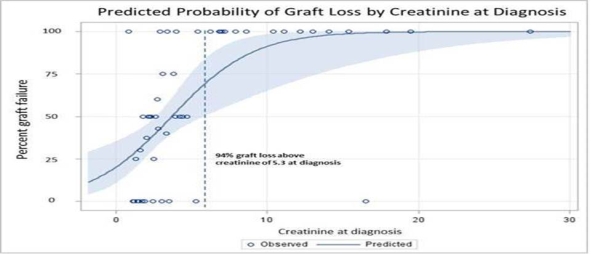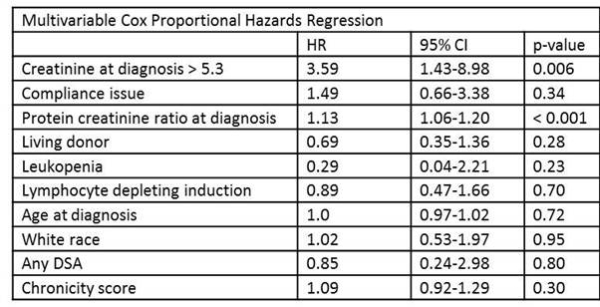Serum Creatinine Is Most Predictive of Graft Loss in Late Antibody Mediated Rejection
Comprehensive Transplant Institute, University of Alabama at Birmingham, Birmingham, AL.
Meeting: 2015 American Transplant Congress
Abstract number: A103
Keywords: Antibodies, Graft survival, Immunoglobulins (Ig), Rejection
Session Information
Session Name: Poster Session A: Kidney Antibody Mediated Rejection
Session Type: Poster Session
Date: Saturday, May 2, 2015
Session Time: 5:30pm-7:30pm
 Presentation Time: 5:30pm-7:30pm
Presentation Time: 5:30pm-7:30pm
Location: Exhibit Hall E
Development of acute antibody mediated rejection (AMR) is associated with graft loss and can occur both early (< 3 months) and late (> 3 months) post-transplant. Treatment and prognosis differ in early and late AMR. Herein, we present a single center experience using high-dose IVIg (2g/kg) for the treatment of late AMR.
Methods: Kidney recipients with negative T and B cell flow crossmatch at transplant and biopsy proven late AMR were included (2009-2013, n=126). All patients were treated with IVIg at 2g/kg and high dose IV corticosteroids. Demographics, Banff 2007 scoring criteria, and laboratory values were described, and multivariable Cox proportional hazards regression was used to identify factors predictive of graft loss.
Results: Median age was 46 years, with 60% male, 51% Caucasian. Median time from transplant to rejection was 3.8 years. Baseline creatinine (Cr) was 1.6 mg/dl, and median Cr at diagnosis was 2.6 mg/dl. 58 patients (46%) eventually lost their grafts at a median of 12 months (IQR: 4-21) from diagnosis. Cr > 5.3 mg/dl at time of diagnosis was associated with a 94% probability of graft loss (figure). After controlling for multiple recipient and donor factors only Cr and urine protein/creatinine ratio at diagnosis were predictive of graft loss (table).
Conclusion: Late AMR has poor prognosis, with 46% graft loss at a median follow-up of 12 months. Serum Cr was a better predictor of subsequent graft failure than histological characteristics in late AMR. These findings help inform treatment plans as well as prognosis. 

To cite this abstract in AMA style:
Agarwal G, Diskin D, Reed R, Locke J, Kumar V. Serum Creatinine Is Most Predictive of Graft Loss in Late Antibody Mediated Rejection [abstract]. Am J Transplant. 2015; 15 (suppl 3). https://atcmeetingabstracts.com/abstract/serum-creatinine-is-most-predictive-of-graft-loss-in-late-antibody-mediated-rejection/. Accessed February 17, 2026.« Back to 2015 American Transplant Congress
